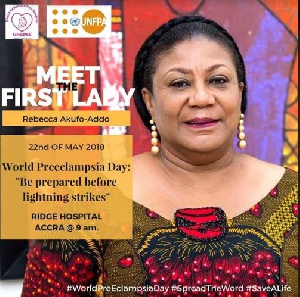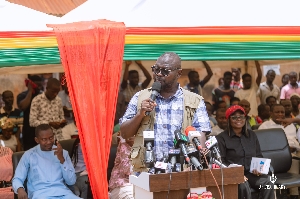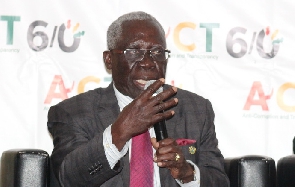 Meet the First Lady on World Preeclampsia Day
Meet the First Lady on World Preeclampsia Day
LIFE
We the people of Ghana seek the blessings of liberty. It is for ourselves and our posterity. Life is precious. Man is the meaning of all creation.
Indeed, ever since the world was made, very few rejoice in any other thing than a seed reproducing her a kind. That is life. All laws are made to grow and protect same and we go to work on them. It is thus unforgivable to allow anything to stand in the way of bringing life to life.
Yet, Preeclampsia stands in the way of many families with often devastating fatal consequences: both mother and child die. We cannot celebrate the disease. We must crush it. In order to do this successfully, we equally need to know it, understand its nature, and then we can overcome it.
In the view of medicine, Preeclampsia is a condition in pregnancy characterized by abrupt hypertension (a sharp rise in blood pressure), albuminuria (leakage of large amounts of the protein albumin into the urine) and edema (swelling) of the hands, feet, and face.
Preeclampsia is the most common complication of pregnancy. It affects about 5% of all pregnancies worldwide. It often occurs in the third trimester (the last third) of pregnancy.
In their Book: Understanding Pre-eclampsia: A guide for parents and health professionals, published in 2017, Joyce Cowan, Professor Chris Redman, and Isabel Walker, place emphasis on the need to define this medical condition.
They asserted:
“A major obstacle to progress in understanding and managing pre-eclampsia has been a striking lack of consensus on how the condition should be defined.”
These scholars in the field further state that the disease definitions are important for two main reasons. The reasons are stated thus:
1. Diagnosis and treatment: if an illness is not clearly defined it is impossible to diagnose it accurately and treat it systematically;
2. Research: if an illness is not clearly defined, different terms of researchers cannot be sure that they are all studying the same condition. Hence, this Center shall hazard a third and that is if an illness is not clearly defined, then standards are hard to set and compliance impossible to be had as same, even if issued by a tribunal will amount to brutum fulmen: impossible to enforce.
It thus appears from the views and workings of American College of Obstetricians and Gynecologists (ACOG) in 1972, the International Society for the Study of Hypertension in Pregnancy (ISSHP) in 1992, definitions from Canada and the world health burden of the disease, the ACOG and ISSHP in 2013 and 2015 respectively, that the following definition of the disease is as follows:
“…hypertension and proteinuria.”
Two things one will easily see or find out are: one, raised blood pressure alone, known in most countries as gestational hypertension; and secondly, raised blood pressure and proteinuria. Each of these conditions must receive attention of a health professional to look out for and manage a possible pre-eclampsia condition to avoid threat to life: mother and unborn child dying. This is because two medical conditions must be developing in the manner infra:
1. An inadequate blood supply from the mother to the placenta, known as placental malperfusion; and
2. A range of maternal problems produced by abnormal signals from the malperfused or stressed placenta.
STATISTICS
According to the Greek mythology, the word Preeclampsia is named after the Greek goddess, lightning. It hits in a moment and crushes in a second and a life is gone.
The statistics on this tragic lightning disease is humbling. It is worthy to note that Preeclampsia is a universal disease.
It is submitted that Preeclampsia affects about five (5) in every hundred (100) white pregnant women in the developed countries. In some other countries it appears to be more common: for example Nicaragua has an incidence of 7.67 per cent, Mongolia 6.71 percent and Brazil has 4.60 per cent.
The condition is even more common in some races, such as black Africans and Polynesians, for reasons that are not well understood. Differences in genetic evolution, diet, education, housing and income have been suggested as possible factors. In Ghana, it has been researched that the number stands as 8-10 percent of every 100 per cent of the nation’s pregnant women.
LIGHT
There is one thing that is closely associated with this pregnancy induced disease: light. Preeclampsia is simply lightning and thunder to those who have witnessed it. This appears to be of a negative connotation and brings undesirable memories to families and persons who have suffered this fate. Nonetheless, it is the same light that ought to overcome the darkness of this disease. Knowledge is key.
What is it that must be done to avoid and or prevent and or manage the situation when lightning strikes. Just be prepared. It must be noted that Pre-eclampsia is an illness that happens only in pregnancy or shortly after birth. In our preparation we must know the signs and understand the symptoms, risks and management of same.
The concept of Preeclampsia, which invariably deals with symptoms and signs, sits on hypertension and proteinuria. The problem is that neither hypertension nor proteinuria makes pregnant women feel ill.
Attending an antenatal clinic immediately upon detecting pregnancy is the solution. The health experts shall then monitor and do the rest of the work especially on regular checks on blood pressure and urine. Once regular antenatal checks are in place, doctors and midwives are able to see how Preeclampsia develops from its earliest signs.
LAW
This is medicine. But the condition has been described as psychopathological. The conclusions is that Preeclampsia hunts the individual involved as well as families and even the society. Policy is required. Some good policies are in place. Its implementation must be non-negotiable. We know the highest policy of every land is the law. We seek compliance of these laws. Let us lighten ourselves with some very few truths of the legal engagement here.
There is a social contract between the State and her citizens. It must be noted that the State has a responsibility to ensure compliance of every pregnant woman is noted in the medical records of the district where she lives and attends antenatal.
This must not be left to the woman or the family alone to decide. The failure of a pregnant woman to ensure the safety of her unborn child with her own life must be compensated by a vigilant society for the protection of an innocent life. This is a state’s duty and the right of the unborn child.
Thus, in the process, a mother’s life shall surely be saved. It is a question of pubic duty, not a private right.
There are policies that govern how our hospitals are run. The actors therein must operate on the pinnacle of their professional best as so many of them already do. A health facility must always note, once it assumes the medical care of a patient, a contract is born. Health facilities have enjoyed dearly their rights under these contracts and patients in Ghana have forgiven some acute violation of their obligations under the contract. This is likely to change sooner than later.
The last actor in the face of policy for want of time and space, is the Regulator of the health industry. Their work is the most difficult. The fear of few health specialists and brain drain flight. It is understood. However, these difficulties must not beget the forgetfulness of the value of a single soul. Regulators must go to work and ensure compliance of good behavior, ethics and optimal professional competence. This is non-negotiable.
PREECLAMPSIA SUBDUED
The disease Preeclampsia is a medical condition. But it is also a social phenomenon. It thus calls for actors cooperation and coordination as well as policy implementation and enforcement. A pregnant woman requires the light of knowledge on the condition. It must be given through antenatal. She must be monitored to act on that knowledge for the sake of her own life and the life of the unborn child. The health specialists must be held to the highest standards of their profession. Above all, the State with her agent Regulators in the health industry, must be made by the people of Ghana to ensure compliance of the law and policies governing the industry.
This is all that we need to do as a people to bring the knees of this awful disease down to submission. Let us go work on them and let there be light.
Koiwah Koi – Larbi Ofosuapea,
Fellow – Center For Constitutional Order, CENCORD Project Lead – Ghana Action on Pre-eclampsia, GHAPEC












